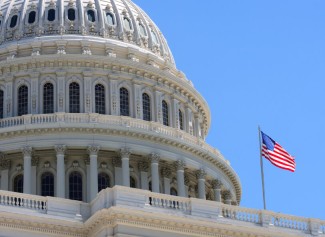Congress has a pivotal opportunity with pending legislation to help industry become cleaner, more competitive, and better able to meet U.S. climate goals. The United States needs to invest in clean industrial technologies to remain globally competitive, because many of its foreign rivals are already making these investments.
In the coming weeks, Congress will decide the provisions of a bill that could not only boost U.S. competitiveness but also help decarbonize the industrial sector, which now accounts for more than a fourth of U.S. greenhouse gas emissions. The House passed a bill earlier this month, the America COMPETES Act, that includes three key manufacturing provisions. A related Senate bill on competitiveness, approved last year, does not contain these provisions, but lawmakers negotiating the final legislation should include them to improve competitiveness and spur decarbonization.
These three provisions would do the following:
First Three Transformative Industrial Technologies: Some of the greatest available carbon savings per federal dollar are in measures to help commercialize innovative industrial processes. A provision offered by Rep. Kathy Castor (D-FL) would authorize $9.5 billion to support the first three commercial-scale implementations of transformative industrial technologies. One example could be a cement plant that reuses large portions of its carbon dioxide emissions as a feedstock.
The provision would allow the United States to accelerate the commercialization of low-carbon technologies for manufactured goods—something that Canada, Japan, the European Union, and China have already begun to do. In Canada, for example, Apple, Alcoa, Rio Tinto, the Canadian government, and others are building a factory using a low-carbon process for making aluminum.
These installations of new technologies will both foster partnerships between manufacturers and government and create jobs.
Flex-Tech: This provision, offered by Rep. Paul Tonko (D-NY), would spread nationwide a very successful program in New York State that improves the energy efficiency, carbon intensity, and sustainability of manufacturing facilities. The program helps manufacturers assess and implement site-specific energy and sustainability investments that reduce energy costs, increase productivity, and reduce carbon emissions.
For example, the New York Flex-Tech program helped the 150-year-old Steinway piano plant in Long Island City increase productivity, reduce waste, and lower energy costs $30,000 annually by implementing a host of energy efficiency measures and installing a solar thermal project.
Commercial Deployment of Efficient Technologies for Industry: This provision by Rep. Mike Doyle (D-PA) supports the deployment of clean industrial technologies. It builds on the Energy Act of 2020's funding for their research, development, and demonstration by adding the further step of commercial deployment. It would authorize $5 billion, and also may be eligible for $500 million already appropriated under the bipartisan infrastructure bill enacted earlier this year.
To ensure the competitiveness of U.S. industry in a world transitioning to new decarbonized technologies, Congress should include these three provisions in its final competitiveness bill. The provisions will spur U.S. innovation and transformation that will strengthen U.S. manufacturing and yield low-carbon products for consumers all across the world.



